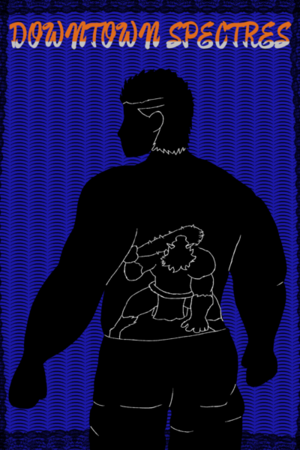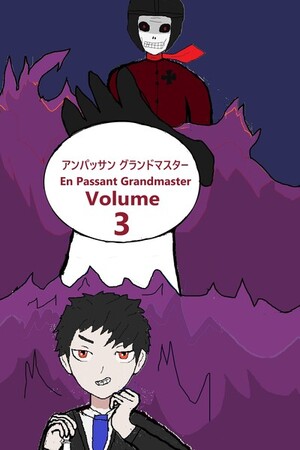Chapter 2:
Chapter II: The Prince
The Self-Proclaimed Devil
While awaiting his time to appear before the guests, a thought ran through Ryoki’s mind. He paced towards the window, swiftly mounting the porch, and pressed his head against the cold window pane in attempts to see through the dusk. The Yanglish king would most certainly have imperial guards accompanying him, even if his arrival was nothing more than a friendly visit, even if he was in the presence of Shingan, the strongest warrior, the guards should’ve still been there as a formality. And indeed, dear reader, out of the corner of his eye, Ryoki was able to get a glimpse of two men dressed in military clothing standing on either side of the main entrance gate. Ryoki particularly wanted to see their star talismans, the sources of their powers, but unfortunately, both men were wearing elegant long robes, covering their necks. He stood like that for a little while, his breath forming little clouds against the window.
“Ryoki-sama, get down from there! It is dangerous!” exclaimed a frightened servant. Ryoki felt ashamed being caught in this manner. Not in the manner of improper behaviour… or rather for exactly that, improper behaviour, childish behavior, perceived in a state of fascination that he thought he was alone to experience in absolute secrecy. He flushed as he got down from the porch and apologised.
“Your father is expecting you downstairs.” She said in a hurry, fussing over him like a hen over a chick, adjusting his clothes, brushing off specks of dust, and smoothing out creases with practiced hands. She led him out of the room, and they descended the stairs leading into the main hall together, which, upon a renewed inspection by Ryoki, had taken a completely new form. All the preparations were complete, the chandeliers were shining brightly, and two long tables hugged the sides of each wall of the main hall, filled to the brim with various delicacies. There were many guests, some of whom were familiar to Ryoki, local elites, and figures of more or less significant political importance within the Mura region; however, there undoubtedly was a surplus of unfamiliar faces, many of whom were dressed in synonymous, matching attire. Sleek white robes with gold accents were the motif of these fine gentlemen, who, dear reader, were members of the newly formed parlament. I would like to go into greater depth describing each and one of them to you, dear reader, as some of them do play a relatively significant role in the later chapters of this story, however, I am deciding against doing so for now simply because through the eyes of a growing child that is Ryoki Minamoto these figures are infinitely insignificant foreign entities, blurred, distant strangers, and so I cognitively make the decision to not describe them, to you, to align us more accurately with the requiem of a child.
Ryoki followed the servant, Mrs Hanamo, if you must know her name, dear reader, and if so, god bless your inquisitive soul, through the crowded room, giving frisk salutations and polite bows to all the adults that greeted him as they made their way through the crowds of guests. Having made a successful showcase of the young Minamoto for the majority of the guests, Hanamo led Ryoki towards the living room, which was located opposite the piano room. He entered, taking in the familiar scenery enhanced with extraneous extravaganza. The shifting of the house, the abundance of guests, and the cacophony of chatter all contributed to heightening that mysterious, overwhelming, aforementioned feeling. The center of the room still featured a large couch with a short table facing a cozy fireplace, which was conveniently lit before the arrival of the guests. There was a low carved wooden table featuring a decorative chess set placed between the couch and the fireplace, which was currently in use. There were two, technically three figures, seated at the couch, inspecting the position with a delighted fancy. Though the seating arrangement certainly contained more space for a few more of the guests, it remained unclaimed as the guests, abundant in the ‘white robe with golden accents’-ed men, who chose to stand in a polite semi-circle.
Let us now move onto the three central figures of our portrait and be rid of this lengthy description dear reader. The first figure, and the only figure residing on the left portion of the couch, was Ryoki’s father, Shingan. He was dressed in his usual military attire of similar color schemes as other political figures from the capital, with the key distinction being the noticeably higher abundance of gold accents and ornaments that decorated his clothing. His sharp eyes were relaxed, briefly shooting glances at the chessboard, which seemed to have transposed to a relatively abandoned state.
The second figure, a thin, tall blonde man, was seated next to him, his blue eyes were gently cast downwards at the position. The softness of his gaze indicated a passive participation in both the game and the discussion. There was an air of mystique surrounding that figure and his relaxed, satisfied expression. He seemed rather modest and introverted, and his white robe had no golden accents at all.
The final figure, and perhaps the most peculiar, was a little boy around Ryoki’s age. He shared striking similarities with the tall blonde man. His tiny face was dominated by his rosy, plump cheeks, and his hair was fine and shining like fine silk… no gold even. His cheek was resting on the thigh of the mysterious man, and he was toying with his delicate lips with his thumb as a form of entertainment. His eyes were dim and cast upon the chessboard that was semi-forgotten; however, as soon as Ryoki came into his field of vision, they became bright and exuberant in an instant. He smiled at him as his movements roused the other two of Ryoki’s presence as well. Father looked at him.
“Ah, Ryoki, my boy, come here.”
Ryoki hesitantly took a step forward, contemplating on the timing and the degree of respect he should show the guests. His father's eyes flashed. He froze and instantly bowed.
“My, you have such a polite son, Minamoto,” Remarked the tall, skinny figure.
“Thank you, your majesty”.
“Ah, come dear, don’t be shy.” He signaled Ryoki to approach them with a hint of impatience.
Ryoki took a couple more steps forward. Shingan lifted him and sat him on his lap. He felt uncomfortable but dared not adjust himself. That mysterious feeling that bothered him all day was at an all-time high. He glanced with curiosity at the little boy, presumably the prince, who was hugging his father’s waist and was sneaking likewise glances from behind him as if from a sort of sanctuary. The king's hand rested upon him like a blanket.
“This is my son, Murakami,” the king said, his voice gentle, almost amused. “He’s been very excited to meet you, Ryoki. He’s heard stories, you see. About your brilliance.”
Shingan chuckled. “He is quite talented, if I may say so myself,” he said, his voice booming just a bit louder, obviously pleased. “Ever since he was five. We had to replace the house chess tutor after he beat him three times in a row.”
Ryoki felt happy that he was being praised. Murakami seemed happy too.
“Will you play with me?”
He looked first at his father, then at Shingan, seeking hints of permission.
“If his highness wishes.”
“Oh, please,” the king chuckled, raising a hand in polite protest. “It's healthy for young developing children to play. Let them.”
It was at this moment that a familiar voice, which previously had been lost, or rather lay in the shadows of the depths of the semicircle of the living room, distinguished itself from the others along with its owners. Like a predator, with malignant squinted eyes and an overly stretched smile, Misaki pounced at the opportunity.
“Ryoki, dear, why won’t you take his highness’s heir and show him that new melody that you have prepared for us?” Without waiting for Ryokis' response with flamboyant enthusiasm, she bowed to Murakami, “You know we have a piano room right across the hall…” she went on. But was quickly cut off by a harsh dismissive remark by shingan. -”Again with your piano nonsense” She glared at him, her eyes almost ready to pop out but dared not escalate the conflict. Ryoki felt reciprocative frustration. He has spent weeks preparing this piece, not because he wanted to but because Misaki wanted to, and he didn’t want to play it and yet the least he deserved as compensation was the applause and the praise.
Ryoki and Prince Murakami were stationed in Ryoki’s bedroom. There was a hint of indignation in Ryoki’s posture as the more perceptive of the two. Prince seemed unbothered. The chatter of the party guests was permeating the floor. A sense of duty drove Ryoki to speak.
“So, what would Your Majesty like to play?”
“Do you have any toys, Ryoki?” asked the prince, with a sudden turn of his head after scanning his bedroom.
“I do not.”
“Really? That’s a shame. Do you not like them?”
“I do not.”
“Why not?”
“Because they are childish and a waste of time.”
“But why is it wrong to be childish? Daddy says that adults face many hardships later in life, so he always advised me to enjoy my childishness and my childhood to the fullest.”
“Well, I suppose being childish isn’t wrong per se, but a matter of usefulness and efficiency. One can easily enjoy being childish but choose to practice useful skills like piano or chess as a form of entertainment.”
“But if you think about it, aren’t those things toys as well? You play the piano and you play chess bot.”
“Well, yes, if you put it like that, but those aren’t toys. They are complex and sophisticated, and regarded as high class.”
“So you only play with the toys that other people like?”
“No, it’s not like that. I play them because it’s prestigious and efficient.”
“So not because they are fun to you?”
Ryoki was caught off guard, but he didn’t back down. He hurried with the response, fearing that the absence of sound that should’ve been emitting from his gaped mouth would be indicative of absence of a counterpoint.
“Of course I enjoy it, but it also happens to be prestigious and efficient.”
“But what makes it prestigious and efficient?”
“Their complexity and intricacies.”
“And who decides that?”
“What?”
“You know, that it is prestigious and efficient?”
“Scholars and musicians and masters of the craft.”
“But games and toys are childish, right? Shouldn’t this mean that the opinion of kids like you and me should matter more than scholars?”
“No, because these things aren’t games, and they aren’t for kids like us to decide. We should just do as we are told. That’s why we have parents — to tell us what’s right and what’s wrong.”
“Strange… my daddy always told me to decide such things for myself.”
Murakami's relentless, childish questioning persevered and overwhelmed Ryoki. Indignation transfused to outright ire. Ryoki was staring at the floor, vision tunneling before suddenly everything became clear at once: Strings, colorful strings, vibrant strings, ominously exuberant strings, of various thickness and vector, all meticulously, vexatiously, asynchronously were tugging on every limb, organ, and fiber of Ryoki’s very being.
The rest of that evening was of absolute irrelevance; the children drew a couple of pictures, the adults drank and continued indulging in their gayness, and so and so.



Please sign in to leave a comment.